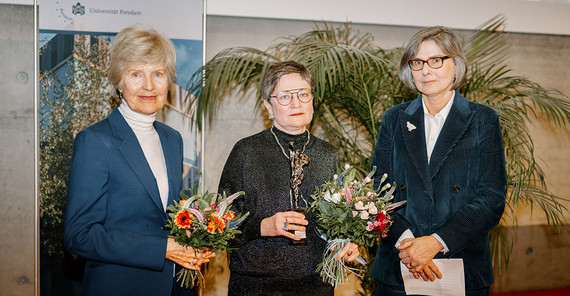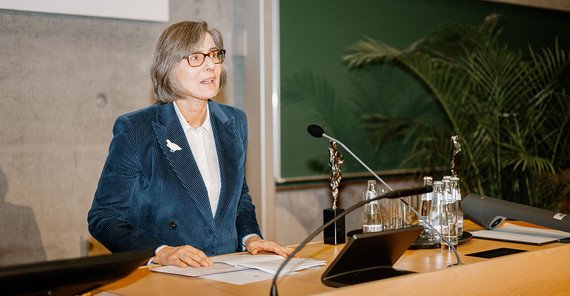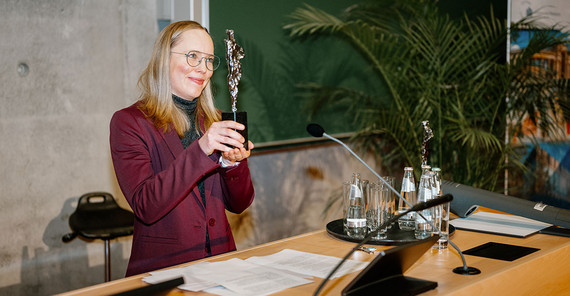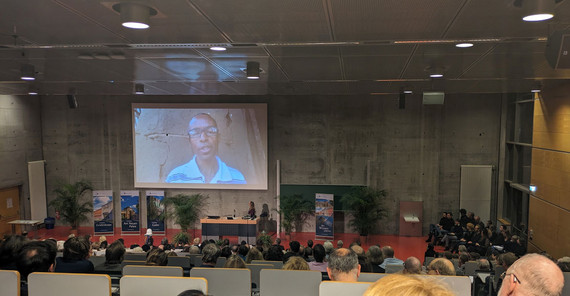Ethiopian-born Gerawork Teferra Gizaw lives and works in Kakuma Refugee Camp in Kenya, where Potsdam historian Prof. Dr. Marcia Schenck met him in 2016 as a participant in her course on global history. “He was an incredibly fast learner and acquired the skills of an oral historian which he subsequently put to good use exploring different facets of camp life,” Schenck reports. “Our encounters in makeshift classrooms across the camp marked the beginning of an enriching collaboration that spanned various projects, including co-authored publications, joint teaching initiatives, and enlightening discussions.”
At Kakuma Refugee Camp, Gizaw is currently working for Jesuit Worldwide Learning and Xavier University as an Academic Adviser and Learning Facilitator. A community archive is being established within the camp to commemorate 30 years of camp history, drawing on interviews, videos, and household items to give testimony to the legacy of permanence amidst temporariness. But Gizaw’s extraordinary commitment goes beyond geographical borders and extends his influence to international platforms. His presentations, which often have to take place virtually due to travel restrictions, provide profound insights into displacement and post-conflict scenarios and bring researchers and practitioners together for a meaningful discourse. His research work, often penned under challenging conditions of limited resources and connectivity, spoke volumes of his scholarly rigor and resilience, Marcia Schenck emphasized in her laudatory speech.
She noted that as an educator and mentor, Gizaw pursued an approach that went far beyond the conventional classroom. His involvement in a semester-long email dialog with Potsdam students dealing with the history of refugees was an example of his commitment to fostering global dialog. “In Gerawork Gizaw, we witness the epitome of a scholar and humanist. His unwavering commitment to using scholarship as a tool for dialog, understanding, and transformation is inspiring. His work, undertaken in a challenging environment, is a testament to his determination to contribute to a more understanding, tolerant, and just world,” Schenck said. Recognizing Mr. Gizaw’s work with this award not only honored his remarkable achievements but also amplified his voice, extending his impact to a broader audience and enabling him to continue his invaluable work in and beyond the Kakuma Refugee Camp, she added.
The political philosopher Olga Shparaga is considered one of the most important public voices of the Belarusian opposition movement. “As a political scientist, she expands our knowledge of civil society and the development of a European identity in the post-Soviet space. As an activist, she worked with great courage for the peaceful transition of power in her country,” said Professor Dr. Barbara Stollberg-Rilinger, Professor of Early Modern History at Westfälische Wilhelms University of Münster and Rector of the Institute for Advanced Study Berlin, who gave the laudatory speech.
In exile, Olga Shparaga now campaigns for a free and democratic Europe beyond the borders of the European Union. In addition to her academic research and teaching, she has been active as a journalist and has been mediating between Eastern and Western Europe. She was temporarily imprisoned in October 2020 for her membership in the Coordination Council of the Belarusian Protest Movement, which was founded by Svetlana Tikhanovskaya to organize the peaceful and orderly transition of power. She then fled into exile in Vilnius to avoid a criminal trial. She was a fellow at the Institute for Advanced Study Berlin until spring 2022; she is currently a fellow at the Institute for Human Sciences in Vienna.
Olga Shparaga deals with questions of national and social identity formation and collective memory politics, with the current structural change of the public sphere, with the resistance movements in Eastern Europe, and with European political identity beyond the EU, but also with the role of art in contemporary Belarusian society. In 2021, Suhrkamp published her monograph “The Revolution Has a Female Face: The Case of Belarus” in German, the original version of which was awarded the Belarusian PEN Prize. In it, she analyses the structure of the Belarusian democracy movement and clarifies why it is precisely gender policy issues that form the center of civil society mobilization and, at the same time, incur the wrath of autocratic regimes.
“Olga Shparaga analyzes political theory from the perspective of a philosopher with a broad historical education and combines her research with incredibly courageous political activism. Her central concern was and is to promote cross-border solidarity against right-wing authoritarianism and Russian neo-imperialism and to advocate for a free Europe that extends beyond the borders of the EU,” Barbara Stollberg-Rilinger said. The Voltaire Prize for Olga Shparaga was not only honoring a highly deserving scientist and human rights activist. It would also help give the Belarusian freedom movement the attention it deserves and demonstrate that it was not deemed a lost cause in the West, Stollberg-Rillinger added.
The “Voltaire Prize for Tolerance, International Understanding and Respect for Differences”, sponsored by the Friede Springer Foundation, has been awarded by the University of Potsdam since 2017. Previous laureates are Turkish political scientist Dr. Hilal Alkan, who denounced the war in the Kurdish territories and the actions of the security forces against civilians and subsequently lost her job; Guatemalan sociologist Dr. Gladys Tzul Tzul, who is an activist for the rights of indigenous peoples in Central America; and the Afghan philosopher Ahmad Milad Karimi for his professional dedication as a mediator between cultures. In 2020, the prize was awarded to media and IT law expert Gábor Polyák, honoring his tireless dedication to freedom of the press and the media in Hungary. In 2021, the prize went to the political scientist and human rights activist Elisabeth Kaneza for her fight against discrimination, and in 2022, it went to the historian and political scientist Duong Keo from Cambodia, who advocates for a more conscious approach regarding the past of his homeland. In 2023, Hong Kong-born legal scholar and author Amy Lai was honored for her dedication to the freedom of expression.
Contact: Karina Jung, Executive Assistant for Friend- and Fundraising
Phone: +49 331 977-153054
E-Mail: junguuni-potsdampde
Internet: www.uni-potsdam.de/en/voltaire-preis/
Media information 17-01-2024 / No. 008




